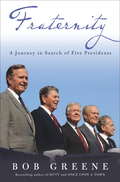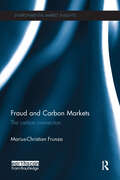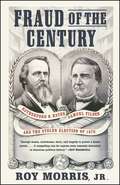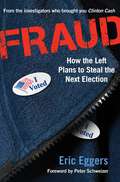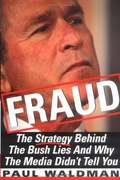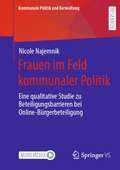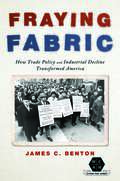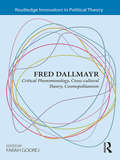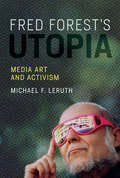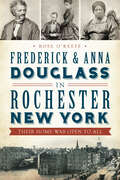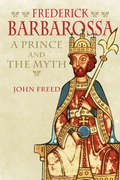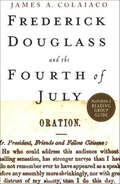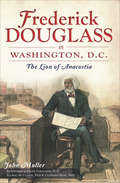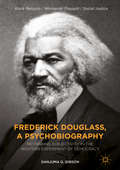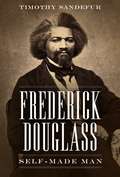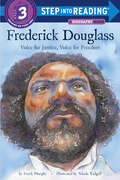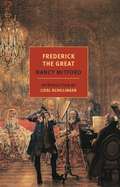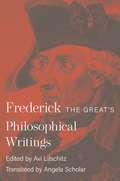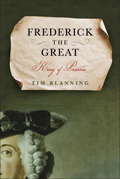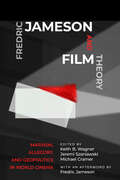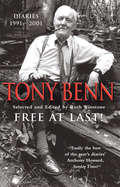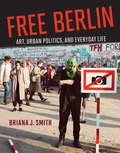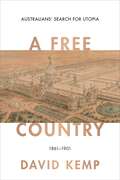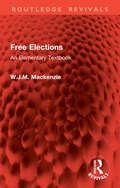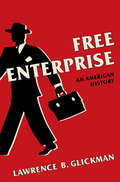- Table View
- List View
Fraternity: A Journey in Search of Five Presidents
by Bob Greene"What if you set off on a vacation trip in search of history--and your destination was the men who had been president?" Asking himself that tantalizing question, bestselling author and award-winning journalist Bob Greene embarked on a long journey across the breadth of the nation, hoping to spend time with Richard Nixon, Gerald Ford, Jimmy Carter, George Bush and Ronald Reagan. The result of his odyssey is Fraternity. Rich with the sounds of the presidents' own voices, Fraternity is dramatic, surprising, funny, revealing, inspiring, tragic, touching and unforgettable: a story destined to be read and enjoyed not just now, but far into the future as Americans think about who we are as a people.Here is Nixon, in an unmarked office high above Manhattan, explaining the reason for his solitary walks through New York streets at 5:30 every morning. Here is Carter, riding in a Secret Service van, recalling the sting of his family's being mocked for their rural Southern heritage, even after he had won the White House. Here is Ford, beside a golf course fairway, laughing at his startled discovery that of all his presidential papers, the one worth the most on the open market was a letter from a woman who tried to kill him. Here is Bush, on the road with his son, remembering his despair and anger at encountering a swastika carved into the sand behind an elegant resort on American soil. And here is Nancy Reagan, in a Beverly Hills hotel, on the haunting first night she must stand in for her husband after the announcement of his illness.A travelogue of the national spirit that chronicles a quest stretching over fifteen years and starring the biggest names in the modern American saga, this is living history of the most human kind, and Bob Greene at his very best.
Fraud and Carbon Markets: The Carbon Connection (Environmental Market Insights)
by Marius-Christian FrunzaThe VAT Carousel Fraud has seriously undermined the financial integrity of the European Union Emissions Trading Scheme (EU ETS). This timely book is the first to give an overview of fraud in the carbon market. Written by a former broker, it presents unique material on the carbon fraud mechanics and analyses the missing trader fraud (VAT fraud) on European carbon allowances markets with a focus on financial and organised crime issues. Fraud and Carbon Markets: The Carbon Connection assesses the weaknesses of the Kyoto Protocol and environmental markets, using statistics as a forensic tool on the capital markets. It describes specific cases, the court investigations and various mechanisms. It addresses issues of money laundering and international fraud on capital markets, such as stock manipulation, by exploring the financial mechanisms of the fraud, their impact on the market behaviour and the consequences on their econometric features. Researchers and students in climate change policy, environmental finance, financial law, organised crime, forensic statistics, financial regulation and risk management as well as financial regulators and policy makers will find this book of great interest.
Fraud of the Century: Rutherford B. Hayes, Samuel Tilden, and the Stolen Election of 1876
by Roy Morris Jr.The bitter 1876 contest between Ohio Republican Governor Rutherford B. Hayes and New York Democratic Governor Samuel Tilden was the most sensational and corrupt presidential election in American history. It was also, in many ways, the final battle of the Civil War. Although Tilden received some 265,000 more popular votes than his opponent, and needed only one more electoral vote for victory, contested returns in three southern states still under Republican-controlled Reconstruction governments ultimately led to Hayes's being declared the winner after four tense months of brazen political intrigue and threats of violence that brought armed troops into the streets of the nation's capital. In this major work of popular history and scholarship, Roy Morris, Jr., takes readers to Philadelphia in America's centennial year, where millions celebrated the nation's industrial might and democratic ideals; to the nation's heartland, where Republicans refought the Civil War by waging a cynical "bloody shirt" campaign to tar the Democrats as the party of disunion and rebellion; and finally into the smoke-filled back rooms of Washington, D.C., where the will of the people was thwarted and the newly won rights of four million former slaves were ignored, leading to nearly ninety years of legalized segregation in the South.
Fraud: How the Left Plans to Steal the Next Election
by Eric EggersCan an election be stolen? You bet it can. The intrepid reporter Eric Eggers has uncovered just how easy it is to cast a fraudulent ballot—canceling out your vote and in some cases deciding elections. We know—despite official denials—that voter fraud is happening. In fact, Eggers shows, it’s rampant, and it’s all over the country. Worse, many famous civil rights organizations encourage voter fraud and frustrate its prosecution. Every proposed voting security measure and every attempt to enforce existing laws is treated as an attack on the right to vote. But of course, the real threat to civil rights, free and fair elections, and the rule of law is voter fraud. And in case after shocking case, Eggers shows how voter fraud is subverting American democracy. In his frightening and thought-provoking book, Eggers highlights: • How so-called “progressive” organizations promote and explain away voter fraud • Why voter fraud is a growing threat—and tied to illegal immigration • How swing states in national elections could be swung by voter fraud
Fraud: The Strategy Behind the Bush Lies and Why the Media Didn't Tell You
by Paul WaldmanAnalysis of the man and his first administration.
Frauen im Feld kommunaler Politik: Eine qualitative Studie zu Beteiligungsbarrieren bei Online-Bürgerbeteiligung (Kommunale Politik und Verwaltung)
by Nicole NajemnikIm Mittelpunkt der Arbeit steht die leitende Forschungsfrage nach Einflussfaktoren auf die Beteiligung von Frauen an kommunalen Online-Partizipationsverfahren. Diese werden mithilfe der Bourdieuschen Analysewerkzeuge technologischer Habitus, digitales Kapital, Feld kommunaler Politik und männliche Herrschaft untersucht. Als empirische Fallstudie wird das Online-Partizipationsverfahren zum Wuppertaler Bürgerbudget 2019 herangezogen. Die Arbeit liefert sowohl auf theoretischer als auch auf praktischer Ebene wichtige Erkenntnisse: Erstens werden analytische Hinweise dafür geliefert, dass sich Bourdieus Theorie der Praxis für eine Untersuchung von Einflussfaktoren auf die Beteiligung von Frauen an kommunalen Online-Partizipationsverfahren eignet und dass politische Partizipation nicht losgelöst von dem Feld, in dem sie stattfindet, erklärt werden kann. Zweitens werden konkrete Handlungsempfehlungen für die kommunale Bürgerbeteiligungspraxis formuliert. Dabei werden sowohl mögliche Ansatzpunkte zur Reduzierung von geschlechtsspezifischen Beteiligungsbarrieren bei kommunalen Online-Partizipationsverfahren aufgezeigt als auch Ansätze zur Überwindung geschlechterübergreifender Beteiligungsbarrieren diskutiert.
Fraying Fabric: How Trade Policy and Industrial Decline Transformed America (Working Class in American History)
by James C. BentonThe decline of the U.S. textile and apparel industries between the 1940s and 1970s helped lay the groundwork for the twenty-first century's potent economic populism in America. James C. Benton looks at how shortsighted trade and economic policy by labor, business, and government undermined an employment sector that once employed millions and supported countless communities. Starting in the 1930s, Benton examines how the New Deal combined promoting trade with weakening worker rights. He then moves to the ineffective attempts to aid textile and apparel workers even as imports surged, the 1974 pivot by policymakers and big business to institute lowered trade barriers, and the deindustrialization and economic devastation that followed. Throughout, Benton provides the often-overlooked views of workers, executives, and federal officials who instituted the United States’ policy framework in the 1930s and guided it through the ensuing decades. Compelling and comprehensive, Fraying Fabric explains what happened to textile and apparel manufacturing and how it played a role in today's politics of anger.
Fred Dallmayr: Critical Phenomenology, Cross-cultural Theory, Cosmopolitanism (Routledge Innovators in Political Theory)
by Farah GodrejFred Dallmayr’s work is innovative in its rethinking of some of the central concepts of modern political philosophy, challenging the hegemony of a modern “subjectivity” at the heart of Western liberalism, individualism and rationalism, and articulating alternative voices, claims and ideas. His writings productively confound the logocentrism of Western modernity, while providing alternative conceptions of political community that are post-individualist, post-anthropocentric and relational. The editor has focused on work in three key areas: Critical phenomenology and the study of politicsThe first selections focus on the philosophical roots of Dallmayr’s work in two of the most innovative intellectual trends of the twentieth century: phenomenology and critical theory. These chapters outline some of the main arguments advanced by practitioners of phenomenology, particularly “existential phenomenology,” as well the guiding ideas of critical theory and critical Marxism, while tracing Dallmayr’s debt to thinkers such as Heidegger, Gadamer, Habermas, Adorno and Merleau-Ponty. Cross-cultural theoryThese readings illustrate Dallmayr’s explorations beyond the confines of Western culture, as this phase of his thinking turns toward what is now called cross-cultural or “comparative” political theory. In an approach that maintains its linkage with critical phenomenology, Dallmayr asserts that Western (or European-American) political theory can no longer claim undisputed hegemony; rather it must allow itself to be contested, amplified and corrected through a comparison with non-Western theoretical traditions and initiatives. CosmopolitanismThese selections explore the final phase of Dallmayr’s work, in which he applies his insights on cross-cultural studies to the context of global politics, rebutting Samuel Huntington’s “clash of civilizations” thesis, and instead arguing for a cosmopolitanism that takes a middle path between both global universalism and restrictive particularism, advocating sustained dialogue and respectful mutual learning between countries and civilizations.
Fred Forest's Utopia: Media Art and Activism (Leonardo)
by Michael F. Leruth“France's most famous unknown artist,” the innovative media provocateur Fred Forest, precursor of Eduardo Kac, Jodi, the Yes Men, RT Mark, and the Guerilla Girls.The innovative French media artist and prankster-provocateur Fred Forest first gained notoriety in 1972 when he inserted a small blank space in Le Monde, called it 150 cm2 of Newspaper (150 cm2 de papier journal), and invited readers to fill in the space with their own work and mail their efforts to him. In 1977, he satirized speculation in both the art and real estate markets by offering the first parcel of officially registered “artistic square meters” of undeveloped rural land for sale at an art auction. Although praised by leading media theorists—Vilém Flusser lauded Forest as “the artist who pokes holes in media”—Forest's work has been largely ignored by the canon-making authorities. Forest calls himself “France's most famous unknown artist.” In this book, Michael Leruth offers the first book-length consideration of this iconoclastic artist, examining Forest's work from the 1960s to the present.Leruth shows that Forest chooses alternative platforms (newspapers, mock commercial ventures, video-based interactive social interventions, media hacks and hybrids, and, more recently, the Internet) that are outside the exclusive precincts of the art world. A fierce critic of the French contemporary art establishment, Forest famously sued the Centre Pompidou in 1994 over its opaque acquisition practices. After making foundational contributions to Sociological Art in the 1970s and the Aesthetics of Communication in the 1980s, the pioneering Forest saw the Internet as another way for artists to bypass the art establishment in the 1990s. Arguing that there is a strong utopian quality in Forest's work, Leruth sees this utopianism not as naive or conventional but as a reverse utopianism: rather than envisioning an impossible ideal, Forest reenvisions and probes the quasi-utopia of our media-augented everyday reality. The interface is the symbolic threshold to be crossed with an open mind.
Frederick & Anna Douglass in Rochester New York: Their Home Was Open to All
by Rose O'KeefeThe story of the upstate New York home where the orator and former slave lived with family, houseguests, and fugitives on the Underground Railroad. Despite living through one of our nation&’s most bitter and terrifying times, Frederick Douglass and his wife, Anna, raised five children in a loving home with flower, fruit, and vegetable gardens in Rochester, New York for twenty-five years beginning in 1848. While Frederick traveled widely, fighting for the freedom and rights of his brethren, Anna cared for their home, family, and extended circle. Their house was open to fugitives on the Underground Railroad, visiting abolitionists, and houseguests who stayed for weeks, months, and years at a time. In this book, local history expert Rose O&’Keefe weaves together the story of the Douglasses&’ experience in Rochester and the indelible mark they left on the Flower City. Includes illustrations
Frederick Barbarossa: The Prince and the Myth
by John FreedFrederick Barbarossa, born of two of Germany’s most powerful families, swept to the imperial throne in a coup d’état in 1152. A leading monarch of the Middle Ages, he legalized the dualism between the crown and the princes that endured until the end of the Holy Roman Empire.<P><P> This new biography, the first in English in four decades, paints a rich picture of a consummate diplomat and effective warrior. John Freed mines Barbarossa’s recently published charters and other sources to illuminate the monarch’s remarkable ability to rule an empire that stretched from the Baltic to Rome, and from France to Poland. Offering a fresh assessment of the role of Barbarossa’s extensive familial network in his success, the author also considers the impact of Frederick’s death in the Third Crusade as the key to his lasting heroic reputation. In an intriguing epilogue, Freed explains how Hitler’s audacious attack on the Soviet Union in 1941 came to be called “Operation Barbarossa.”
Frederick Douglass and the Fourth of July
by James A. ColaiacoA critical evaluation of the address the preeminent African American abolitionist and orator gave in observance of Independence Day.On July 5th, 1852, Frederick Douglass, one of the greatest orators of all time, delivered what was arguably the century’s most powerful abolition speech. At a time of year where American freedom is celebrated across the nation, Douglass eloquently summoned the country to resolve the contradiction between slavery and the founding principles of our country. In this book, James A. Colaiaco vividly recreates the turbulent historical context of Douglass’ speech and delivers a colorful portrait of the country in the tumultuous years leading to the Civil War. Now including a reader’s guide with discussion points, this book provides a fascinating new perspective on a critical time in American history.Praise for Frederick Douglass and the Fourth of July“If you’re feeling blasé about this year’s observance of our oldest patriotic holiday, James A. Colaiaco’s Frederick Douglass and the Fourth of July should stir you out of complacency. . . . What makes [it] essential reading is its deepening of one’s appreciation for how the color-blind, malleable Constitution is a tissue of ambiguity and compromises.” —The Wall Street Journal“Colaiaco provides the most complete exposition yet of Douglass’s constitutional abolitionism . . . [He] performs a vital service in reviving the moral spirit of America’s greatest exemplar of black manhood.” —Claremont Review of Books“[Colaiaco’s] examination of this long-forgotten masterpiece is long overdue and superbly realized.” —Harold Holzer, author of Lincoln at Cooper Union, co-chairman U.S. Lincoln Bicentennial Commission
Frederick Douglass in Washington, D.C.: The Lion of Anacostia (American Heritage Ser.)
by John Muller&“Reconstruct[s] Douglass&’s life in the nation&’s capital, both at home and in the halls of power, in ways that no other biographer has done&” (Leigh Fought, author of Women in the World of Frederick Douglass). The remarkable journey of Frederick Douglass from fugitive slave to famed orator and author is well recorded. Yet little has been written about Douglass&’s final years in Washington, DC. Journalist John Muller explores how Douglass spent the last eighteen years of his life professionally and personally in his home, Cedar Hill, in Anacostia. The ever-active Douglass was involved in local politics, from aiding in the early formation of Howard University to editing a groundbreaking newspaper to serving as marshal of the District. During this time, his wife of forty-four years, Anna Murray, passed away, and eighteen months later, he married Helen Pitts, a white woman. Unapologetic for his controversial marriage, Douglass continued his unabashed advocacy for the rights of African Americans and women and his belief in American exceptionalism. Through meticulous research, Muller has created a fresh and intimate portrait of Frederick Douglass of Anacostia. Includes photos! &“Muller&’s book connects Douglass to the city and neighborhood the way no other project has yet been able to . . . you&’re able to re-imagine the man and re-consider the possibilities of the place he once lived.&” —Martin Austermuhle, DCist
Frederick Douglass, a Psychobiography: Rethinking Subjectivity In The Western Experiment Of Democracy (Black Religion/womanist Thought/social Justice Ser.)
by Danjuma G. GibsonIn the extreme context of the American slavocracy, how do we account for the robust subjectivity and agency of Frederick Douglass? In an environment of extremity, where most contemporary psychological theory suggests the human spirit would be vanquished, how did Frederick Douglass emerge to become one of the most prolific thinkers of the 19th century? To address this question, this book engages in a psychoanalytic examination of all four of Frederick Douglass’ autobiographies. Danjuma Gibson examines when, how, and why Douglass tells his story in the manner he does, how his story shifts and takes shape with each successive autobiography, and the resulting psychodynamic, pastoral, and practical theological implications.
Frederick Douglass: Self-Made Man
by Timothy SandefurFrederick Douglass rose to become one of the nation's foremost intellectuals―a statesman, author, lecturer, and scholar who helped lead the fight against slavery and racial oppression. Unlike other leading abolitionists, however, Douglass embraced the U.S. Constitution, insisting that it was an essentially anti-slavery document and that its guarantees for individual rights belonged to all Americans, of whatever race.
Frederick Douglass: Voice for Justice, Voice for Freedom (Step into Reading)
by Frank MurphyLearn about the abolitionist Frederick Douglass and his fight for freedom in this Step 3 Biography Reader!Frederick Douglass was a keystone figure in the abolitionist movement, and his story has impacted generations of people fighting for civil rights in America. He was born to an enslaved mother and grew up with the horrors of slavery. In the course of his childhood, he was able to learn to read, and soon realized that reading and language were a source of power, and could be the keys to his freedom. Frederick Douglass spoke and wrote about injustice and equality, and his words profoundly affected the conversation about slavery in America. His activism will resonate with kids today who are observing and participating in our activist culture. Step 3 Readers feature engaging characters in easy-to-follow plots about popular topics--for children who are ready to read on their own.
Frederick the Great
by Nancy Mitford Liesl SchillingerThe Prussian king Frederick II is today best remembered for successfully defending his tiny country against the three great European powers of France, Austria, and Russia during the Seven Years' War. But in his youth, tormented by a spectacularly cruel and dyspeptic father, the future military genius was drawn to the flute and French poetry, and throughout his long life counted nothing more important than the company of good friends and great wits. This was especially evident in his longstanding, loving, and vexing relationship with Voltaire. An absolute ruler who was allergic to pomp, a non-hunter who wore no spurs, a reformer of great zeal who maintained complete freedom of the press and religion and cleaned up his country's courts, a fiscal conservative and patron of the arts, the builder of the rococo palace Sans Souci and improver of the farmers' lot, maddening to his rivals but beloved by nearly everyone he met, Frederick was--notwithstanding a penchant for merciless teasing--arguably the most humane of enlightened despots.In Frederick the Great, a richly entertaining biography of one of the eighteenth century's most fascinating figures, the trademark wit of the author of Love in a Cold Climate finds its ideal subject.
Frederick the Great's Philosophical Writings
by King Frederick IIThe first modern English edition of diverse Enlightenment-era writings by Prussian monarch Frederick the GreatFrederick II of Prussia (1712–1786), best known as Frederick the Great, was a prolific writer of philosophical discourses, poems, epics, satires, and more, while maintaining extensive correspondence with prominent intellectuals, Voltaire among them. This edition of selected writings, the first to make a wide range of Frederick’s most important ideas available to a modern English readership, moves beyond traditional attempts to see his work only in light of his political aims. In these pages, we can finally appreciate Frederick’s influential contributions to the European Enlightenment—and his unusual role as a monarch who was also a published author.In addition to Frederick’s major opus, the Anti-Machiavel, the works presented here include essays, prefaces, reviews, and dialogues. The subjects discussed run the gamut from ethics to religion to political theory. Accompanied by critical annotations, the texts show that we can understand Frederick’s views of kingship and the state only if we engage with a broad spectrum of his thought, including his attitudes toward morality and self-love. By contextualizing his arguments and impact on Enlightenment beliefs, this volume considers how we can reconcile Frederick’s innovative public musings with his absolutist rule. Avi Lifschitz provides a robust and detailed introduction that discusses Frederick’s life and work against the backdrop of eighteenth-century history and politics.With its unparalleled scope and cross-disciplinary appeal, Frederick the Great’s Philosophical Writings firmly establishes one monarch’s multifaceted relevance for generations of readers and scholars to come.
Frederick the Great: King of Prussia
by Tim BlanningThe definitive biography of the legendary autocrat whose enlightened rule transformed the map of Europe and changed the course of history Few figures loom as large in European history as Frederick the Great. When he inherited the Prussian crown in 1740, he ruled over a kingdom of scattered territories, a minor Germanic backwater. By the end of his reign, the much larger and consolidated Prussia ranked among the continent's great powers. In this magisterial biography, award-winning historian Tim Blanning gives us an intimate, in-depth portrait of a king who dominated the political, military, and cultural life of Europe half a century before Napoleon. A brilliant, ambitious, sometimes ruthless monarch, Frederick was a man of immense contradictions. This consummate conqueror was also an ardent patron of the arts who attracted painters, architects, musicians, playwrights, and intellectuals to his court. Like his fellow autocrat Catherine the Great of Russia, Frederick was captivated by the ideals of the Enlightenment--for many years he kept up lively correspondence with Voltaire and other leading thinkers of the age. Yet, like Catherine, Frederick drew the line when it came to implementing Enlightenment principles that might curtail his royal authority. Frederick's terrifying father instilled in him a stern military discipline that would make the future king one of the most fearsome battlefield commanders of his day, while deriding as effeminate his son's passion for modern ideas and fine art. Frederick, driven to surpass his father's legacy, challenged the dominant German-speaking powers, including Saxony, Bavaria, and the Habsburg Monarchy. It was an audacious foreign policy gambit, one at which Frederick, against the expectations of his rivals, succeeded. In examining Frederick's private life, Blanning also carefully considers the long-debated question of Frederick's sexuality, finding evidence that Frederick lavished gifts on his male friends and maintained homosexual relationships throughout his life, while limiting contact with his estranged, unloved queen to visits that were few and far between. The story of one man's life and the complete political and cultural transformation of a nation, Tim Blanning's sweeping biography takes readers inside the mind of the monarch, giving us a fresh understanding of Frederick the Great's remarkable reign.
Fredric Jameson and Film Theory: Marxism, Allegory, and Geopolitics in World Cinema
by John Mackay Dudley Andrew Jeremi Szaniawski Fredric Jameson Pansy Duncan Michael Cramer Paul Coates Dan Hassler-Forest Naoki Yamamoto Mike Wayne Keith B. Wagner Alvin K. Wong Mercedes VazquezFrederic Jameson and Film Theory is the first collection of its kind, it assesses and critically responds to Fredric Jameson’s remarkable contribution to film theory. The essays assembled explore key Jamesonian concepts—such as totality, national allegory, geopolitics, globalization, representation, and pastiche—and his historical schema of realism, modernism, and postmodernism, considering, in both cases, how these can be applied, revised, expanded and challenged within film studies. Featuring essays by leading and emerging voices in the field, the volume probes the contours and complexities of neoliberal capitalism across the globe and explores world cinema's situation within these forces by deploying and adapting Jamesonian concepts, and placing them in dialogue with other theoretical paradigms. The result is an innovative and rigorously analytical effort that offers a range of Marxist-inspired approaches towards cinemas from Asia, Latin America, Europe, and North America in the spirit of Jameson's famous rallying cry: 'always historicize!'.
Free At Last: Diaries 1991 - 2001
by Tony BennTony Benn is the longest serving MP in the history of the Labour Party. He left Parliament in 2001, after more than half a century in the House of Commons, to devote more time to politics. This volume of his Diaries describes and comments, in a refreshing and honest way, upon the events of a momentous decade including two world wars, a change of government in Britain and the emergence of New Labour, of which he makes clear he is not a member. Tony Benn's account is a well documented, formidable and principled critique of the New Labour Project, full of drama, opinion, humour, anecdotes and sparkling pen-portraits of politicians on both sides of the political divide. But his narrative is also broader and more revealing about day-to-day political life, covering many aspects normally disregarded by historians and lobby correspondents, relating to his work in the constituency, including his advice surgeries. This volume also offers far more of an insight into Tony Benn's personal life, his thoughts about the future and his relationship with his family, especially his remarkable wife Caroline, whose illness and death overshadow these years. Tony Benn is a unique figure on the British political landscape: a true democrat, a passionate socialist and diarist without equal. With this volume, his published Diaries cover British politics for over sixty years. It is edited, as are all others, by Ruth Winstone.
Free Berlin: Art, Urban Politics, and Everyday Life
by Briana J. SmithAn alternative history of art in Berlin, detaching artistic innovation from art world narratives and connecting it instead to collective creativity and social solidarity.In pre- and post-reunification Berlin, socially engaged artists championed collective art making and creativity over individual advancement, transforming urban space and civic life in the process. During the Cold War, the city&’s state of exception invited artists on both sides of the Wall to detour from artistic tradition; post-Wall, art became a tool of resistance against the orthodoxy of economic growth. In Free Berlin, Briana Smith explores the everyday peculiarities, collective joys, and grassroots provocations of experimental artists in late Cold War Berlin and their legacy in today&’s city.These artists worked intentionally outside the art market, believing that art should be everywhere, freed from its confinement in museums and galleries. They used art as a way to imagine new forms of social and creative life. Smith introduces little-known artists including West Berlin feminist collective Black Chocolate, the artist duo paint the town red (p.t.t.r), and the Office for Unusual Events, creators of satirical urban political theater, as well as East Berlin action art and urban interventionists Erhard Monden, Kurt Buchwald, and others. Artists and artist-led urban coalitions in 1990s Berlin carried on the participatory spirit of the late Cold War, with more overt forms of protest and collaboration at the neighborhood level. The temperament lives on in twenty-first century Berlin, animating artists&’ resolve to work outside the market and citizens&’ spirited defenses of green spaces, affordable housing, and collectivist projects. With Free Berlin, Smith offers an alternative history of art in Berlin, detaching artistic innovation from art world narratives and connecting it instead to Berliners&’ historic embrace of care, solidarity, and cooperation.
Free Country: Australians' Search for Utopia 1861–1901
by David KempA Free Country: Australians' Search for Utopia 1861-1901 tells how Australians, inspired by their new democracy, attempted to use their freedom to build a society without social and economic conflict. As the second book in a landmark five-volume Australian Liberalism series, A Free Country shows the successes and missteps in the attempt to establish the legal and moral foundations for a liberal society in Australia, examining the ideological battles of the period. The national politics of twentieth-century Australia had their roots during this time, as utopian dreams of 'social reconstruction' opposed liberal ideals of individual freedom, fostering the concept of 'class wars' and leading to the ongoing involvement of trade unions in politics. As emerging collective ideas of nationalism, empire, race and class challenged individual rights and threatened to seed domestic and international conflict, liberals succeeded in bringing the six colonies into one Australian nation founded on liberal principles, writing a constitution hailed as the most democratic in the world.
Free Elections: An Elementary Textbook (Routledge Revivals)
by W.J.M. MackenzieOriginally published in 1958 at a time when many African and Asian nations were newly independent or going through the process of independence, this book sets out the facts and arguments which have to be considered in designing and running electoral systems. The book treats the problems of free elections in Africa and Asia objectively and uncontroversially, without pre-supposing any previous training in political science. The discussion of 'free elections' raises large issues about political norms and ideologies and about the working of political systems in different societies, and the book tackles these questions head on. The book gives a balanced account of the whole issue of elections, covering on the one hand qualifications and voting systems, and on the other hand less ‘political’ questions of administration and control, which are of equal importance in the working of an electoral system.
Free Enterprise: An American History
by Lawrence B. GlickmanAn incisive look at the intellectual and cultural history of free enterprise and its influence on American politics Throughout the twentieth century, “free enterprise” has been a contested keyword in American politics, and the cornerstone of a conservative philosophy that seeks to limit government involvement into economic matters. Lawrence B. Glickman shows how the idea first gained traction in American discourse and was championed by opponents of the New Deal. Those politicians, believing free enterprise to be a fundamental American value, held it up as an antidote to a liberalism that they maintained would lead toward totalitarian statism. Tracing the use of the concept of free enterprise, Glickman shows how it has both constrained and transformed political dialogue. He presents a fascinating look into the complex history, and marketing, of an idea that forms the linchpin of the contemporary opposition to government regulation, taxation, and programs such as Medicare.
